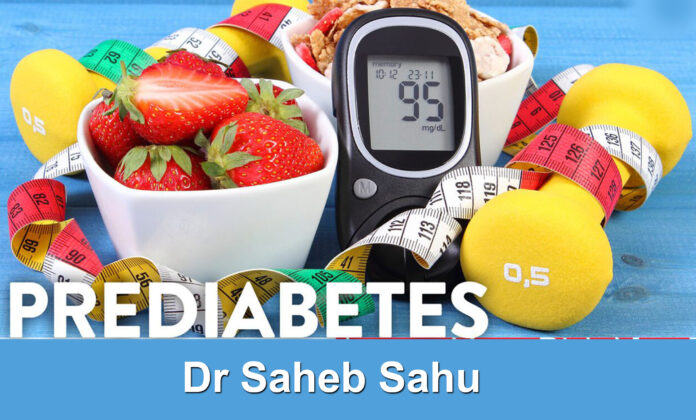Dr Saheb Sahu, FAAP, MPH
Type 2 diabetes does not always arrive with a bang. It can develop slowly but eventually lead to side effects and complications if not well managed. When the body fails to properly make or use the hormone insulin, blood sugar rises, and sustained levels can damage organs from the heart to the kidneys. Common symptoms of type 2 diabetes include: frequent urination, increased thirst and hunger, fatigue, blurred vision, slow healing of cuts and infections, tingling pain or numbness in hands or feet. Long term complications include higher risk of heart attack, high blood pressure, stroke, kidney and eye damage and bacterial or fungal infections.
Indian Context
As of recent estimates, over 77 million people in India have type 2 diabetes. A significant number of people in India with diabetes remain undiagnosed. It is estimated that this number will reach 125 million by 2045. According to recent studies, approximately 70 million people in India are estimated to have prediabetes. Because of poor public health service and recordkeeping, the real number is hard to know. Because of recent lifestyle changes in India, the number of people with diabetes is increasing.
Prediabetes
Prediabetes is a condition where blood sugar levels are higher than normal but not high enough to be diagnosed as diabetes.
Blood sugar or Hemoglobin A1C levels
Normal – Fasting blood sugar level less than 100 mg /dl or A1C – less than 5.6%
Prediabetes – Fasting blood sugar= 100-125mg/dl or A1C=5.7 to 6.4%.
Diabetes – Fasting blood sugar above 126mg/dl or A1C more than 6.5%.
Prediabetes usually has no noticeable symptoms, but some people may experience increased thirst, frequent urination or darken areas of skin, often under the armpits, elbow or in the neck.
Risk Factors
- Being overweight, especially excessive belly fat = waist circumference (WC) morethan 78 cm for Indian men and more than 72cm for women.
- Family history of diabetes
- A sedentary lifestyle
- An unhealthy diet
- Age over 45
- Ethnic background – Asians, Africans, Hispanic and Pacific Islander
Prevention and Management
80 % of the people in USA with prediabetes do not know that they have it. This number will be more than 95% in India. People with prediabetes become diabetic 70% of the time, if they do not make necessary lifestyle changes. The good news is, with lifestyle changes this percentage can be significantly reduced.
Preventive majors that can be taken are:
1- Weight loss– Research suggest that people with prediabetes who lose at least 7% of their body weight, improve their chance of insulin functions and not developing diabetes by almost 60%.
Newer anti-obesity drugs (GLP-1) such as Wegovy, Ozempic, Mounjaro and Saxenda are helping people lose weight. Right now these drugs are quite expensive. These drugs are not specifically approved for diabetes, but recent research suggests that they will cut the diabetic risk by more than 90%.
2- Regular Physical Activity- Regular physical activities help in weight control. They boosts metabolism, reduce blood sugar levels, reduce inflammation, and lower the risk of high blood pressure and heart disease. Physical activities should include 150 minutes of moderate aerobic (walking, running, swimming) exercise per week and at least two days a week of muscle strengthening exercise.
3- A Heart Healthy Diet- For everybody, a balanced, nutrient rich diet can help regulate blood sugar levels, improve insulin sensitivity and support weight control. A healthy diet should consist of whole grains (brown rice and whole wheat), legumes and beans, fish and shrimps, some eggs, low fat dairy products, all kinds of colorful vegetables and fruits. Limit saturated fats, sweets, sugary drinks and ultra-processed foods. Control your portion size.
Conclusion
If you have the risk of developing prediabetes, and are above the age of 40, taking proactive steps now will help you to prevent or delay the onset of type 2 diabetes. Type 2 diabetes is a bad disease. It is a chronic disease which affects multiple organs. You should do everything in your power to prevent it. Get a fasting blood sugar or A1C done now. If the tests show that you are prediabetic, make the necessary lifestyle changes now. Studies have shown that 60 to 70% of people with prediabetes can prevent or significantly delay the progression to type 2 diabetes by above mentioned lifestyle changes.
Programs like the Diabetes Prevention Program (DPP) in US demonstrated that losing just 5-7% of body weight and engaging in 150 minutes of physical activities per week can reduce the risk of developing diabetes about 58% over three years. For individuals over the age of 60, the risk reduction was even higher, around 71%.
Sources:
- CDC.Gov/ Diabetes Prevention Program
- Chat-GPT



